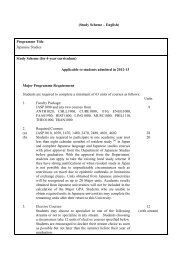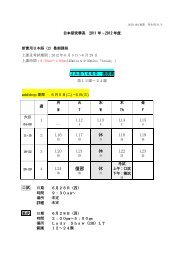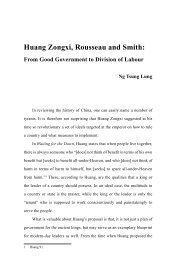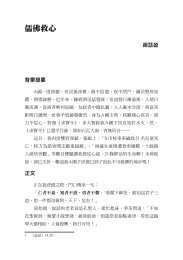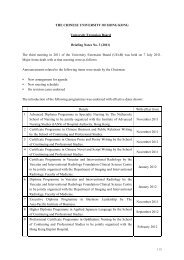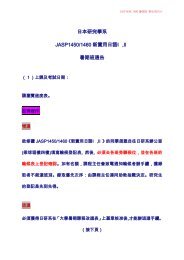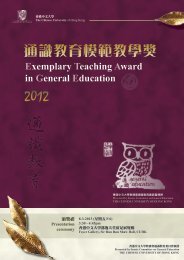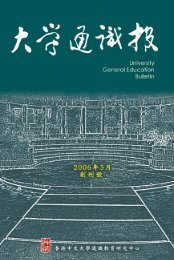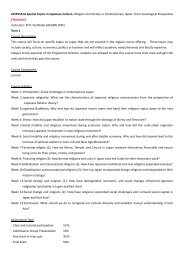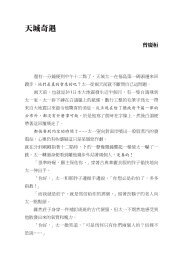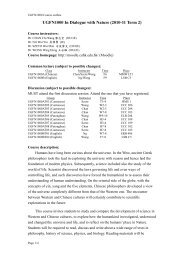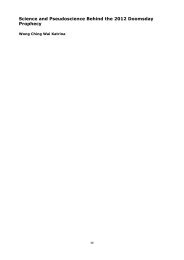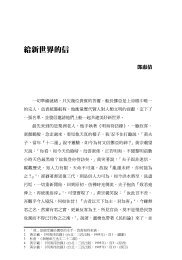ä¸è¼å ¨æ¸ - The Chinese University of Hong Kong
ä¸è¼å ¨æ¸ - The Chinese University of Hong Kong
ä¸è¼å ¨æ¸ - The Chinese University of Hong Kong
You also want an ePaper? Increase the reach of your titles
YUMPU automatically turns print PDFs into web optimized ePapers that Google loves.
12 Special Topic: Assessment in <strong>University</strong> General Education Program<br />
learning. General education can be thought <strong>of</strong> as “that part <strong>of</strong> a curriculum that<br />
is shared by all students, provides broad exposure to multiple disciplines, and<br />
forms the basis for developing important intellectual and civic capabilities”<br />
(Association <strong>of</strong> American Colleges and Universities, 2009a).<br />
<strong>The</strong> planning for this major change in the curriculum has been underway<br />
for years and is scheduled for full implementation at the university level in<br />
2012–2013. General education, a key component <strong>of</strong> the forthcoming fouryear<br />
university curriculum, is a new concept for many faculty in <strong>Hong</strong> <strong>Kong</strong>,<br />
who themselves experienced undergraduate education primarily in <strong>Hong</strong><br />
<strong>Kong</strong>, China, or Great Britain, where there is no longstanding tradition <strong>of</strong><br />
General Education Programs (GEPs). While some <strong>Hong</strong> <strong>Kong</strong> universities<br />
have had or currently have GEPs (e.g., the <strong>Chinese</strong> <strong>University</strong> <strong>of</strong> <strong>Hong</strong> <strong>Kong</strong>,<br />
Lingnan <strong>University</strong>), others have traditionally addressed the need <strong>of</strong> students<br />
for diverse learning experiences beyond their major programs <strong>of</strong> study in<br />
less extensive ways, such as with out-<strong>of</strong>-discipline course requirements,<br />
complementary studies, or college/school breadth requirements.<br />
<strong>The</strong> irony that <strong>Hong</strong> <strong>Kong</strong> faculty have been mandated to add an<br />
“essential” component (General Education) to their curricula, a component<br />
that they themselves have <strong>of</strong>ten not experienced, is not lost. In fact, extensive<br />
efforts at faculty pr<strong>of</strong>essional development at the institutional level as<br />
well as at the <strong>Hong</strong> <strong>Kong</strong> system level [Heads <strong>of</strong> <strong>University</strong> Committee<br />
(HUCOM) Symposia] have targeted this dearth <strong>of</strong> information and lack <strong>of</strong><br />
experience surrounding GEPs in the run-up to the development or revision<br />
<strong>of</strong> each institution’s GEPs. Thus, it is in light <strong>of</strong> the major revision <strong>of</strong> the<br />
undergraduate curriculum and the development and shaping <strong>of</strong> new GEPs in<br />
<strong>Hong</strong> <strong>Kong</strong> that affective learning should be considered.



